Background
Gertrude Anscombe was born on March 18, 1919, in Limerick, Ireland. She was a daughter of Allen Wells Anscombe and Gertrude Elizabeth Anscombe (née Thomas).

19 Westwood Hill, London SE26 6BL, United Kingdom
Sydenham High School where Gertrude Anscombe studied.
St Margaret's Rd, Oxford OX2 6LE, United Kingdom
St Hugh's College where Gertrude Anscombe studied.
Sidgwick Ave, Cambridge CB3 9DF, United Kingdom
Newnham College where Gertrude Anscombe studied from 1942 to 1945.
The Austrian Cross of Honour for Science and Art, 1st class that Gertrude Anscombe received in 1978.







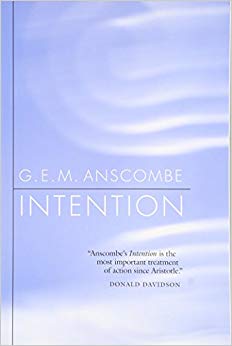
(Intention is one of the masterworks of twentieth-century ...)
Intention is one of the masterworks of twentieth-century philosophy in English. First published in 1957, it has acquired the status of a modern philosophical classic. The book attempts to show in detail that the natural and widely accepted picture of what we mean by an intention gives rise to insoluble problems and must be abandoned.
https://www.amazon.com/Intention-G-M-Anscombe/dp/0674003993/ref=sr_1_fkmr0_1?keywords=Intention+Gertrude+Elizabeth+Margaret&qid=1576498846&s=books&sr=1-1-fkmr0
1957
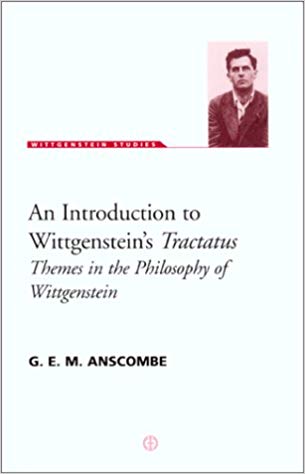
(Anscombe guides us through the Tractatus and, thereby, Wi...)
Anscombe guides us through the Tractatus and, thereby, Wittgenstein's early philosophy as a whole. She shows in particular how his arguments developed out of the discussions of Russell and Frege. This reprint is of the fourth, corrected edition.
https://www.amazon.com/Introduction-Wittgensteins-Tractatus-Wittgenstein-Studies/dp/189031854X/ref=sr_1_1?keywords=An+Introduction+to+Wittgenstein%27s+Tractatus&qid=1576498921&s=books&sr=1-1
1959
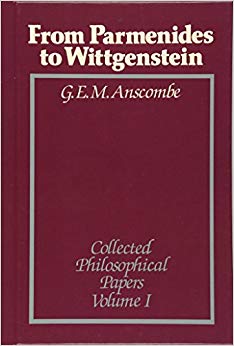
(Early work from a leader in analytic philosophy From Parm...)
Early work from a leader in analytic philosophy From Parmenides to Wittgenstein, Volume 1: Collected Philosophical Papers is part of a multi-volume publication of G.E.M. Anscombe's collected works. Writing on philosophy of mind, philosophy of action, philosophy of language, and philosophical logic, Anscombe is known as one of analytical Thomisms's most prominent figures. This collection includes her writing on the work of her teacher, Ludwig Wittgenstein, with whom she worked closely as co-editor and translator.
https://www.amazon.com/Parmenides-Wittgenstein-Collected-Philosophical-Papers/dp/0631129227/ref=sr_1_1?keywords=From+Parmenides+to+Wittgenstein&qid=1576499349&s=books&sr=1-1
1981
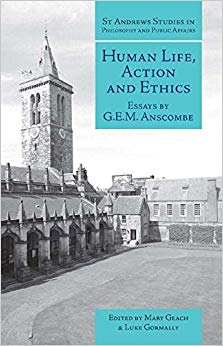
(This volume presents a collection of essays by the celebr...)
This volume presents a collection of essays by the celebrated philosopher Elizabeth Anscombe. This collection includes papers on human nature and practical philosophy, together with the classic 'Modern Moral Philosophy'.
https://www.amazon.com/Human-Life-Action-Ethics-M/dp/1845400615/ref=sr_1_1?keywords=Human+Life%2C+Action+and+Ethics&qid=1576499423&s=books&sr=1-1
2005
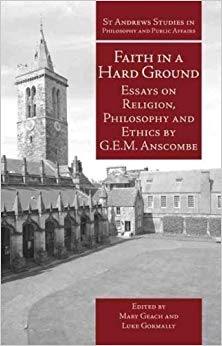
(Elizabeth Anscombe's forthright philosophy speaks directl...)
Elizabeth Anscombe's forthright philosophy speaks directly to many religious and ethical issues of current concern.This collection of her essays forms a companion volume to the critically acclaimed Human Life, Action and Ethics published in 2005.
https://www.amazon.com/Faith-Hard-Ground-Religion-Philosophy/dp/1845401212/ref=sr_1_1?keywords=Faith+in+a+Hard+Ground%3A+Essays+on+Religion%2C+Philosophy+and+Ethics&qid=1576499478&s=books&sr=1-1
2008
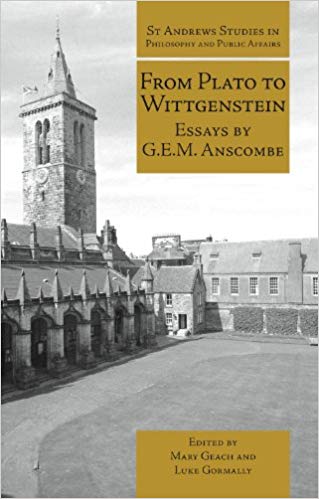
(In 2005 St Andrews Studies published a volume of essays b...)
In 2005 St Andrews Studies published a volume of essays by Anscombe entitled Human Life, Action and Ethics, followed in 2008 by a second with the title Faith in a Hard Ground. Both books were highly praised. This third volume brings essays on the thought of historical philosophers in which Anscombe engages directly with their ideas and arguments.
https://www.amazon.com/Wittgenstein-Andrews-Studies-Philosophy-Affairs-ebook/dp/B006H24F7E/ref=sr_1_1?keywords=From+Plato+to+Wittgenstein&qid=1576499638&s=books&sr=1-1
2011
Gertrude Anscombe was born on March 18, 1919, in Limerick, Ireland. She was a daughter of Allen Wells Anscombe and Gertrude Elizabeth Anscombe (née Thomas).
Gertrude Anscombe attended Sydenham High School. In 1937 she entered St Hugh's College, graduating with a First Class Honors degree in 1941. Anscombe also studied at Newnham College where she attended Ludwig Wittgenstein's lectures from 1942 to 1945.
Gertrude Anscombe took up a Research Fellowship at Somerville College in 1946. She later had a Teaching Fellowship there until 1970. In 1951, Wittgenstein named Anscombe as his literary executor. After that, she became an editor and translator of his writings. In 1970, Anscombe became a professor of Philosophy at Cambridge University. She held this post until 1986.
Gertrude Anscombe published her first book Intention in 1957. She also wrote such books as An Introduction to Wittgenstein's Tractatus, From Parmenides to Wittgenstein, Human Life, Action and Ethics and From Plato to Wittgenstein.
Gertrude Anscombe was an English philosopher, educator, and writer who is known as one of the most important women philosophers of all time. She is famous for her work on ethics and the philosophy of action. Her most widely-known books are An Introduction to Wittgenstein's Tractatus, Human Life, Action and Ethics and From Plato to Wittgenstein.
Anscombe received the Austrian Cross of Honour for Science and Art, 1st class in 1978.
(In 2005 St Andrews Studies published a volume of essays b...)
2011(Early work from a leader in analytic philosophy From Parm...)
1981(Elizabeth Anscombe's forthright philosophy speaks directl...)
2008(Anscombe guides us through the Tractatus and, thereby, Wi...)
1959(This volume presents a collection of essays by the celebr...)
2005(Intention is one of the masterworks of twentieth-century ...)
1957Gertrude Anscombe was converted to the Roman Catholic faith when she studied at school. During her first undergraduate year, she was received into the church.
Gertrude Anscombe had publicly criticized Britain's entry into the Second World War in 1939. She spoke against the use of atomic weapons at the end of World War II. Anscombe also led the protest against Oxford University’s decision to award an honorary degree to the man who ordered the use of atomic weapons against Japan, President Harry S. Truman.
Gertrude Anscombe has a serious interest in the history of philosophy and much of her work has been done through the explicit discussion of such philosophers as Aristotle, Aquinas and Hume. She urged the abandonment of "the law conception of ethics" and a return to the avowedly secular Aristotelian concepts of practical reasoning and virtue.
Anscombe argues that the concept of intention is central to our understanding of ourselves as rational agents. The intentions with which we act are identified by the reasons we choose to act the way we do. She also distinguished extrinsic pleasures – things we enjoy because of the description they fall under – and intrinsic pleasures – things we enjoy regardless of how they are described.
Gertrude Anscombe supported Pope Paul VI's pronouncement that contraceptive measures other than the rhythm method were immoral. Anscombe also said that abortion represented an unjust killing of the innocent.
Quotations:
"The denial of any distinction between foreseen and intended consequences, as far as responsibility is concerned, was not made by Sidgwick in developing anyone's method of ethics'. He made this important move on behalf of everybody and just on its own account; and I think it plausible to suggest that this move on the part of Sidgwick explains the difference between old-fashioned Utilitarianism and the consequentialism, as I name it, which marks him and every English academic moral philosopher since him."
"Christian life meant a separation from the standards of that world: you couldn't be a Baal-worshipper, you couldn't sacrifice to idols, be a sodomite, practice infanticide, compatibly with the Christian allegiance. That is not to say that Christians were good; we humans are a bad lot and our lives as Christians even if not blackly and grossly wicked are usually very mediocre."
"For men to choose to kill the innocent as a means to their ends is always murder."
"You can argue truly enough, for example, that general respect for the prohibition on murder makes life more commodious. If people really respect the prohibition against murder life is pleasanter for all of us - but this argument is exceedingly comic. Because utility presupposes the life of those who are to be convenienced, and everybody perceives quite clearly that the wrong done in murder is done first and foremost to the victim, whose life is not inconvenienced, it just isn't there anymore. He isn't there to complain; so the utilitarian argument has to be on behalf of the rest of us. Therefore, though true, it is highly comic and is not the foundation: the objection to murder is supra-utilitarian."
"Those who try to make room for sex as mere casual enjoyment pay the penalty: they become shallow. At any rate, the talk that reflects and commends this attitude is always shallow. They dishonor their own bodies; holding cheap what is naturally connected with the origination of human life."
Gertrude Anscombe was a Foreign Honorary Member of the American Academy of Arts and Sciences.
Gertrude Anscombe was an independent-minded person and formidable debater. She also was outspoken and often rude. Sometimes others called her "Dragon Lady".
Quotes from others about the person
The Telegraph: "Clad in leopard-skin trousers and a leather jacket, she might sit in silence for minutes on end, puffing on a cigar, after one of her students had finished reading out an essay."
Candace Vogler: "When she is writing for [a] Catholic audience, she presumes they share certain fundamental beliefs,' but she is equally willing to write for people who do not share her assumptions."
Gertrude Anscombe married Peter Geach in 1941. The marriage produced seven children.
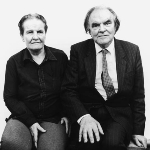
Peter Geach was a British philosopher and professor of logic at the University of Leeds.
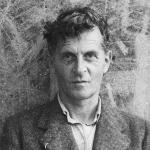
Ludwig Wittgenstein was an Austrian philosopher who worked primarily in logic, the philosophy of mathematics, the philosophy of mind, and the philosophy of language.
